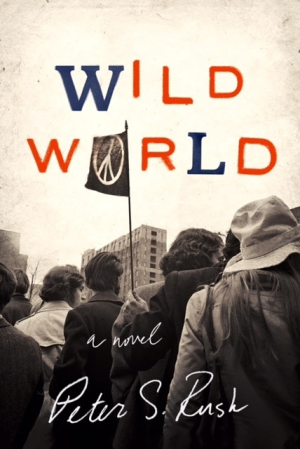Wild World
Wild World is an able portrait of a divisive era, one in which characters sympathetically work to find meaning through chaos and to effect positive change.
Wild World by Peter S. Rush is a riveting exploration of one man trying to change a corrupt system from within.
In the tumultuous 1970s, an era fraught with war and protest, Steve Logan is a senior at Brown University. Madly in love with his girlfriend, Roxy, he plans to begin law school at Georgetown in the fall. His life’s direction seems clear … until four students are killed by national guardsmen at Kent State. In the wake of massive protests on the Brown campus, Steve meets and is heavily inspired by a New York City cop who is driven to end corruption within the force.
Abandoning his plans for law school, Steve joins the Providence Police Department. He is excited to stay closer to Roxy. He wants to help prompt change within the system, but his Ivy League background and unwillingness to bend the rules put him at odds with other officers. As the hard realities of police work set in and his relationships crumble, Steve faces a choice: should he risk his life to overhaul a crooked system, or play it safe and forever wonder what might have been?
Wild World is incredibly insightful, offering a keen look at a complicated era and into the workings of police forces. Steve begins his journey as an idealistic young man excited about rapid cultural changes. Through his time on the force, though, his idealism starts to fade, replaced with a jaded worldview that colors his later decisions. This gritty realism is not all-encompassing, however. The text is rife with light references to the new cultural landscape.
Rush’s agile writing is impressive, easily imparting insights into the characters’ lives as they try to define themselves politically, socially, and morally. Unsure of what the future will offer, they must grow and mature quickly. Steve and Roxy are especially strong characters. While Steve grapples with a world of corruption and crime, Roxy contends with daily demands and becomes increasingly uncomfortable with the man Steve is becoming. Amid a world of change, they must individually decide what matters to them most.
The narrative avoids nostalgia in favor of plot developments that are realistic, fulfilling, and pertinent. Scenes are richly detailed, from pristine college campuses to bustling squad rooms. Dialogue introduces well-timed humor and wit to break up particularly harrowing moments.
Wild World is an able portrait of a divisive era, one in which characters sympathetically work to find meaning through chaos and to effect positive change.
Reviewed by
Amanda Adams
Disclosure: This article is not an endorsement, but a review. The publisher of this book provided free copies of the book and paid a small fee to have their book reviewed by a professional reviewer. Foreword Reviews and Clarion Reviews make no guarantee that the publisher will receive a positive review. Foreword Magazine, Inc. is disclosing this in accordance with the Federal Trade Commission’s 16 CFR, Part 255.

